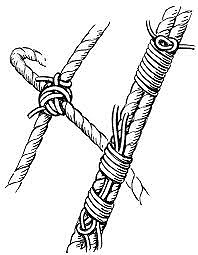Seizing

"As we speak cruel time is fleeing. Seize the day, believing as little as possible in tomorrow." Horace
(Historically bad advice better suited to epic works of fiction.)
"Seizings are a class of stopping knots used to semi-permanently bind together two ropes, two parts of the same rope, or rope and another object. Akin to lashings, they use string or small-stuff to produce friction and leverage to immobilize larger ropes. Seizings are not recommended for heavy loads for critical use as strain reduces the diameter of the main rope and can permit slippage even with proper construction." Wikipedia ©2020 by David A. Schmaltz - all rights reserved
Seizing the day does not seem to insist upon what I though it did. For me, I've long considered Seizing akin to grabbing and holding on, damn the consequences, but Seizing seems more nuanced in practice. It involves connecting, sure, but connecting with purpose and with acknowledgment of likely future stresses and strains. It is definitely not a cavalier grab, but a strategic connecting often employing small-stuff.
"Small-stuff is a nautical and knot-tying term for thin string or twine, as opposed to the thick, heavy ropes that are more often used in sailing. It is commonly used in a whipping to bind the ends of ropes to prevent fraying.
"Historically, the term referred to cordage less than one inch in circumference. Much of the small-stuff onboard ships, especially that used for decorative or fancy ropework, was made by the sailors themselves reusing materials unlaid from old and leftover pieces of larger rope and cable." Wikipedia
I sometimes watch a day slip away and chide myself for not authoritatively Seizing the damned thing before it slipped away from me, a strategy which sometimes seems more inherently self-destructive than in any way helpful. Not having yet achieved the Homeric status of any Ancient Greek chronicler, I recognize that I'm writing my own Iliad and Odyssey, but usually absent the heroics only historians and isolated chroniclers typically trade in. My Hero's Journey seems less defined by decisive moves than by acceptances and self-preserving re-frames. I do not stack any decks in my favor and am learning to leverage whatever cards I'm delt. I've found the advice to courageously seize, generally poor advice unless abiding by the sailor's notion of Seizing, employing SmallStuff.
I swear that I'm fully capable of chewing my own legs off in bitter remorse when I watch an unseized day slip by me. Long, almost languid hours of idleness never leveraged for greater advantage, a sun setting on neither great victory nor devastating defeat, a sighing sunset filled with lukewarm longing, unseized days seem to terminate rather than end. They imply the unseemly scent of a recent act of cowardly omission, not so much a shaming action, but a discoloring inaction when challenged to Seize That Day. But not every day seems that seize-worthy, regardless of what the homily writers insist, and those days seem more born to drift than born to run. Perhaps these are diastolic days, not evidence of arrhythmia, but rest, a useful and valid part of a larger cycle and not a slacking shame. "I seized nothing that day" might say much more than that I did nothing at all or that I failed to answer some potentially heroic call. The phone that didn't ring contributes something, too.
Cleverly designed Seizing slips along an intended axis. Solidly Seizing along every axis, in an attempt to hold any and all slippage seems destined to fail, for it's a fundamental misuse of the technique to employ it to resolve every possible deviation. Seizing works under the conditions that it's intended to work, and merely cloaks and delays catastrophic failure when misapplied. Those days with infinitely many competing forces, such as ones dawning to present a fierce storm, might incite my desire to grab them, to demonstrate my mastery or my manhood, though these seem more destined to frustrate my interests. Masters might choose to stand down rather than seize some days without losing either their mastery or their manhood.
The mythic deployment of heroic effort should not be an everyday affair, but reserved for those very special purposes for which it might seem worthy. Mythic heroes had their down days, too, and most often found no leverage for intruding upon whatever they encountered. Most challenges pass on their own accord. I struggle to remember to focus more upon the small stuff than on the obviously impressive, for the obvious discloses more about the observer than about anything he might observe. I seize most days by connecting opposing forces and by recognizing where the inevitable slippage should properly occur. My Iliad will probably not ever be sung by triumphant choirs, but it seems adequate to hold my SmallThings story together.


